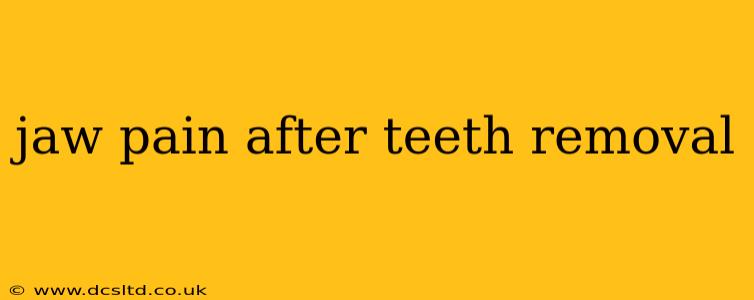Experiencing jaw pain after teeth removal is a common occurrence, often causing significant discomfort and impacting daily life. Understanding the causes, effective treatment options, and preventative measures is crucial for a smoother recovery. This comprehensive guide addresses common concerns surrounding post-extraction jaw pain, providing valuable information for both patients and dental professionals.
What Causes Jaw Pain After Tooth Extraction?
Several factors contribute to jaw pain following tooth extraction. The most prevalent cause is the surgical trauma itself. The removal process involves manipulating the jawbone and surrounding tissues, leading to inflammation and pain. This is a normal part of the healing process, but its intensity varies among individuals.
Beyond surgical trauma, other potential causes include:
- Dry Socket (Alveolar Osteitis): This painful complication occurs when the blood clot protecting the extraction site dislodges or dissolves prematurely. The exposed bone becomes vulnerable to infection and irritation, leading to severe jaw pain.
- Infection: Bacterial infection at the extraction site can cause significant pain, swelling, and fever. This is a serious complication requiring immediate medical attention.
- Sinus Perforation: Extractions in the upper jaw, particularly molars, can occasionally lead to a perforation of the maxillary sinus. This can result in sinus pain that radiates to the jaw.
- Referred Pain: Pain originating from other areas, such as the temporomandibular joint (TMJ), can sometimes be felt in the jaw, especially after a procedure that might have inadvertently strained the area.
- Medication Side Effects: Certain pain medications can have jaw pain as a side effect, though less common.
- Existing TMJ Issues: Pre-existing temporomandibular joint disorders can be exacerbated by the stress of tooth extraction.
How Long Does Jaw Pain After Tooth Extraction Last?
The duration of jaw pain varies depending on the complexity of the extraction, individual healing capacity, and the presence of complications. Mild to moderate pain usually subsides within a week, gradually diminishing in intensity. However, more significant pain or pain lasting longer than a week warrants a visit to the dentist.
It's essential to note: While some discomfort is expected, persistent, severe pain, or pain accompanied by other symptoms like fever or swelling should be addressed immediately.
What Can I Do to Relieve Jaw Pain After a Tooth Extraction?
Managing post-extraction jaw pain often involves a combination of approaches:
- Follow Post-operative Instructions: Adhering strictly to your dentist's post-operative instructions is crucial. This includes taking prescribed pain medication as directed, keeping the extraction site clean, and avoiding strenuous activities.
- Ice Packs: Applying ice packs to the affected area for 15-20 minutes at a time, several times a day, can help reduce swelling and pain.
- Over-the-Counter Pain Relievers: Non-steroidal anti-inflammatory drugs (NSAIDs) like ibuprofen can effectively manage mild to moderate pain.
- Saltwater Rinses: Gently rinsing your mouth with warm salt water can help keep the extraction site clean and prevent infection.
- Soft Food Diet: Sticking to a soft food diet reduces the stress on the extraction site and minimizes discomfort.
- Rest: Adequate rest allows your body to focus on healing.
Is Jaw Pain After Tooth Extraction Normal?
Yes, some degree of jaw pain after a tooth extraction is considered normal. The surgical trauma involved in removing a tooth inevitably causes some inflammation and discomfort. However, the intensity and duration of pain should be manageable. Severe, persistent pain or pain accompanied by other symptoms is not normal and requires professional attention.
When Should I See a Dentist After a Tooth Extraction?
Consult your dentist immediately if you experience:
- Severe or persistent pain that doesn't respond to over-the-counter pain relief.
- Excessive swelling or bleeding.
- Fever or chills.
- Pus or foul odor from the extraction site.
- Numbness or tingling in the jaw or lip.
How Can I Prevent Jaw Pain After Tooth Extraction?
While you can't entirely prevent jaw pain, taking proactive steps can minimize the risk:
- Choose an Experienced Dentist: Opt for a qualified and experienced dentist known for their gentle technique and meticulous aftercare.
- Follow Pre-operative Instructions: Follow your dentist's instructions before the procedure, such as avoiding certain medications or activities.
- Maintain Good Oral Hygiene: Proper brushing and flossing help promote healthy gums and reduce the risk of infection.
This information is for general knowledge and does not constitute medical advice. Always consult your dentist or oral surgeon for diagnosis and treatment of any oral health concern. They can provide personalized guidance based on your specific situation.
